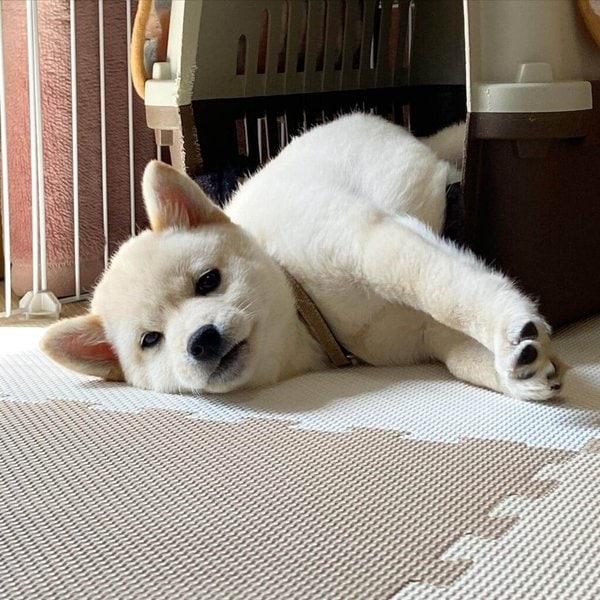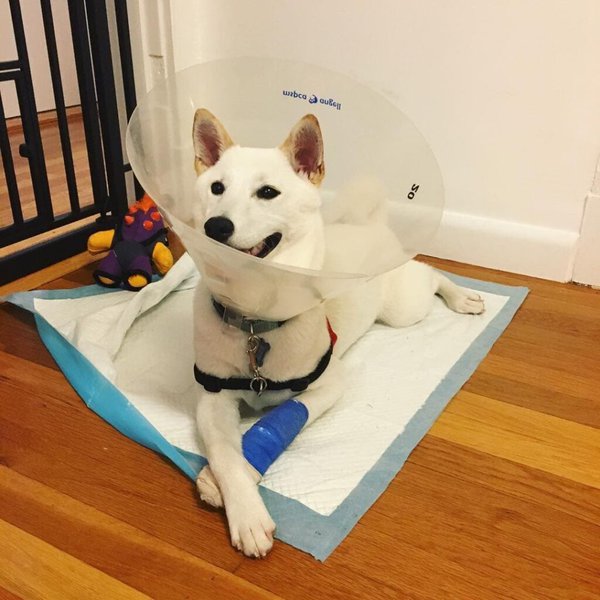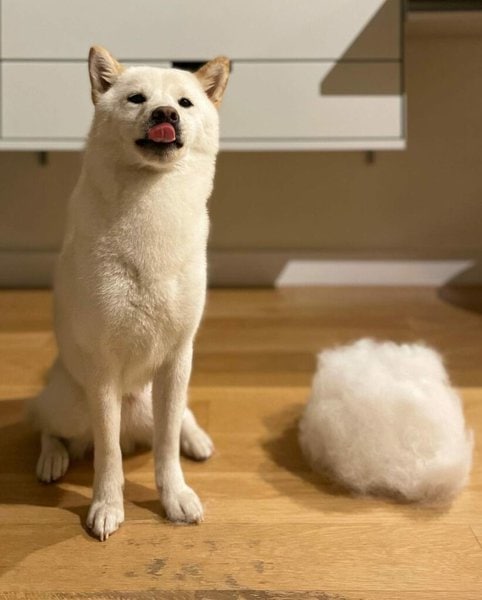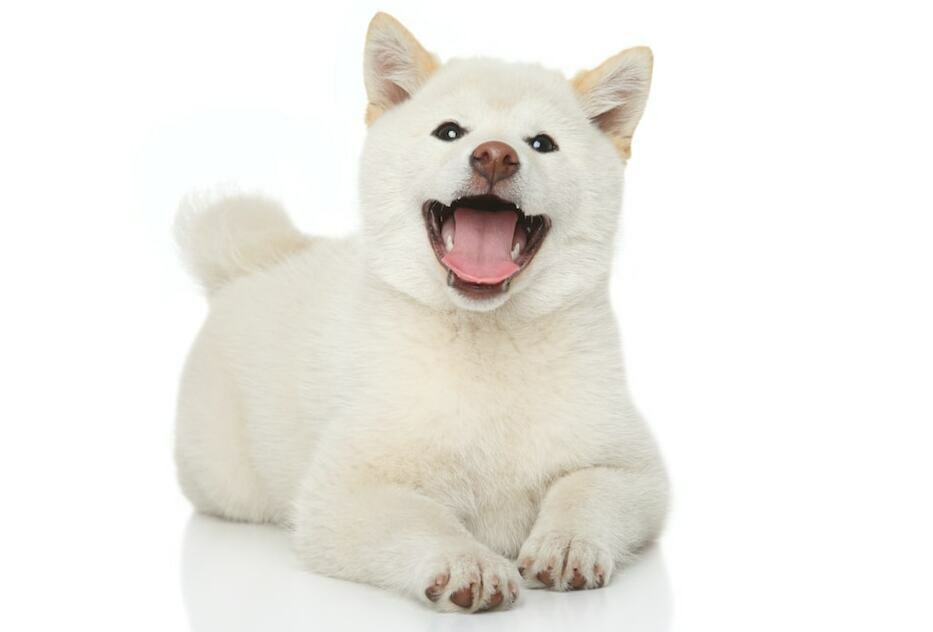Previously used as a hunting dog, the White Shiba Inu Dog is a companion dog, and we often buy them without an understanding of what goes into owning one. I did the research, and here is what you need to know.
So, where can you find the White Shiba Inu Dog? The Shibas are growing in popularity in the West and have become the most popular breed in the area. The breed was introduced to America all the way from Japan some 60 years ago, and has been around since 300 BC. The White Shiba is double coated and the fur is short, with the undercoat being soft, outer coat being stiff and guard hairs are at most 2 inches long.
Even though these White Shiba Inus are purebred, you can easily find them in rescue groups or shelters where you can buy or adopt one. Before you do that, you need to understand what exactly this dog is and how to care for it.
What Is A White Shiba Inu?
The White Shiba Inu is a genetic quirk of Shiba Inu that’s basically white in color.
As mentioned above, the White Shiba Inu is double coated with short fur, and guard hairs to protect the underlying skin. The length of its fur and hairs typically ranges between 1.5 to 2 inches long, which gives its clean and fluffy appearance.
The tail of a White Shiba Inu is rather fluffy with its longer tail hair to protect its body from harsh winter weather. By force of habit, its tail is often curled up, thereby giving it a short tail-like appearance.
Is There A White Shiba Inu?
Yes. Although the White Shiba Inus might be quite rare in some countries, they are available in the West region, commonly in America and Japan.
How Big Do White Shiba Inus Get?
Most male White Shibas are between 14.5 to 16.5 inches tall and weigh approximately 23 lbs, while the females are 13.5 to 15.5 inches tall with approximately 17 lbs.

How Long Do White Shibas Typically Live?
The White Shibas have an average life expectancy of about 13 to 16 years, but they can live for much longer with regular exercise and a healthy lifestyle.
The oldest Shiba dog to ever have lived is the Pusuke that died in December of 2011, at 26 years. This is three years less than the world’s longest-lived dog.
Common Health Issues
Although the White Shiba Inu is known to be a healthy dog breed, some health conditions have been proven to affect this breed. The common health issues include;
- Glaucoma
- Epilepsy
- Allergies
- Hip Dysplasia
- Patellar Luxation
- Chylothorax
- Progressive Retinal Atrophy (PRA)
If you’re planning to buy this dog, you need to see the health clearances of the puppy. Health clearances will help you prove that the dog is cleared and tested for different conditions. For example, a Shiba Inu dog should have health clearances for hip dysplasia, hypothyroidism, certifying that its eyes are normal, etc.
Eye tests, joint, and general body health examinations are recommended during the maturing phase of the dog’s life. This is because some problems may develop, especially when they are young.
However, when they are above two years of age and with a fully developed bone structure, the White Shiba Inus may be considered free from joint problems if none has been detected.

How To Take Care Of White Shiba Inus?
Generally, White Shiba Inus are of low maintenance compared to other pets, and the care needs are minimal. They are known to be a fastidious breed, as they feel a great need to maintain their clean state. You often see them licking their legs and paws, just like cats do.
More often than not, there are things you have to frequently do to properly ensure the dog remains healthy and fit.
Exercise
As with most dog breeds, Shibas should be walked or otherwise exercised daily. They require a minimum of one hour of exercise daily. When they don’t exercise enough, they may become frustrated, leading to aggressive or destructive behavior, such as furniture chewing.
Diet
The White Shia are generally a healthy breed and will flourish in a wide range of balanced diets. Ideally, their diets consist of meat as their main source of protein, rice, fish, wildfowl, etc.
However, it is crucial to note that many dogs of this breed are allergic to corn, soy and wheat, so don’t buy foods with these filler ingredients as the main ingredient.
Therefore, we recommend Pet Plate and its vet-developed meals. You can be sure that every meal is freshly prepared, delicious, nutritious, free of by-products, and safe for your dog to eat and enjoy.
Multivitamins
While a healthy and fresh diet is meant to provide the dog with all essential vitamins and minerals, supplementing using the right multivitamins can be beneficial. The best way to have great results is to find a quality manufacturer whose products are certified and tested.
However, it is important to avoid excess vitamin A and D because excessive intake may harm the bones and blood vessels of the dog.
Invest In Dental Water Additives
A popular issue in dogs is gum disease, and dental water additives are a simple way to prevent the bacteria build up in the dog’s mouth. They can also prevent bad breath, tartar formation and protect both their teeth and gums.
Are White Shiba Inus Aggressive? Temperaments Of White Shiba Inus
The White Shiba Inus can be quite aggressive because they are natural hunters and they like to chase due to their high prey drive.
As energetic dogs, White Shibas often display aggression as a way to release their pent-up energy. Compared with other animals of similar energy levels, like foxes, these Shibas move in a similar fashion, swiftly and easily with nimble and elastic steps.
When the dog is unhappy or provoked, it may produce a loud and high pitched scream. This can also happen when handling the dog in an unacceptable way. However, the White Shiba Inu may make a similar sound during periods of joy, for example, after the return of a favored human.
At What Age Do White Shiba Inus Calm Down?
The White Shiba Inus tend to calm down when they reach the adolescence age of about six months. However, this will only happen with proper socialization training.
Do White Shiba Inus Like To Cuddle?
Yes. However, they will only be affectionate when they want to be. Most Shibas won’t sit on your lap or cuddle like other dogs would do, but when they are in the mood, they tend to show affection by being excited when you return home, engaging in eye contact or sometimes following you as you move around.
Can White Shiba Inus Be Left Alone?
The White Shiba Inus may be left home alone for a few hours, but training may be necessary to ensure the dog remains safe. You can get them toys to entertain them while they are home alone because when they get bored, they may chew on your furniture, causing irreparable damage.

Do White Shiba Inus Shed A Lot? Grooming Tips For White Shiba Inus
The Shiba Inus don’t like to be bathed, so it is crucial to start when they are still young. Their coats are coarse, short to medium in length, and naturally waterproof, which means there is only a little need for bathing.
While they have a thick undercoat that can protect them from freezing, shedding can also be challenging. Shedding is mainly caused by seasonal changes, especially during the summer season. However, brushing daily can help eradicate this problem.
Since the coat of Shiba Inu is important to protect them from both hot and cold temperatures, owners shave their coats. To ensure they stay neat and healthy, you need to;
- Brush their coats to distribute oils and remove dead hair at least once a week, especially when the dog is shedding too much.
- Bathing them now and then is crucial but be sure not to do it too often because it will only dry out the coat and skin. Most Shiba Inu’s owners bathe them every three to four months.
- Trimming the dog’s nails at least once a month if your dog doesn’t tear them down naturally prevents painful tears and other problems. However, you need to ensure that the cut is not too far because the toenails have blood vessels that may easily bleed. If you’re not certain about what to do, you can always reach out to a vet or a groomer.
- Brushing the Shibas teeth at least two times a week to remove the bacteria or tartar build. If you can, daily brushing is even better to prevent bad breath and gum disease.
- Always check for signs of infections like inflammation on the feet, eyes, ears, mouth, nose, skin, sores, and rashes. Weekly examinations while grooming the White Shiba Inu dog will help you spot health issues early.
How Do I Get My White Shiba Inu To Stop Shedding?
The White Shiba Inu dog breed is fairly easy to groom, unlike other dogs, but they are also extreme shedders. For this reason, you need to follow the guidelines below to ensure that their shedding is managed through the seasonal changes;
Brush Their Coats
A great way to manage shedding is to consistently brush the dog’s fur, especially when heavy shedding seasons come. Brushing their fur at least twice a week is recommended.
Several types of deshedding brushes can be used, but we recommend the Furminator Undercoat Tool to come in handy to make work easier for you. Besides its ergonomically designed handle to improve grip, it will also protect your dog’s skin from scrapes and scratches.
Bathing
You can bathe your White Shiba Inu dog at home using the Seamus Cherry Blossom Whitening Dog Shampoo to reduce the stains and leave the coat looking fresh and feeling soft. However, since their fur is resilient to water, you won’t have to bathe them often because excessive washing can also strip their fur of essential natural oils.
Blowing The Undercoat
Blowing a dog’s undercoat while grooming may also help loosen the fur as well as take out most of their shredded fur. A high-powered blow dryer and hand sprayer are recommended during this process to ensure you have less fur falling out around your house.
Related Questions
How Much Is A White Shiba Inu? The cost of a White Shiba Inu may vary depending on several factors, including age and health condition. That being so, the cost of buying a White Shiba Inu ranges from $1,000 to $2,500 due to the rising popularity of this breed over the past ten years.
Why Do White Shiba Inus Not Like Water? The White Shiba Inus do not like to go to water, and they prefer staying dry and tidy. This is because they are not a water breed and do not instinctively like water. This means that they will constantly walk away from puddles to ensure they won’t wet their paws. However, owners can correctly and slowly introduce them to water during their socializing training, where they can fall in love with water and even enjoy swimming. Moreover, the White Shiba Inus prefer to drink very clean water without any impurities.
Will A White Shiba Inu Kill A Cat? Although a White Shiba is a great family dog, the breed can be aggressive to cats but not always. With proper training when they’re young, the dog will get along with animals and other children. The dogs might perceive the cats as prey and might chase them or attack them. For this reason, if your White Shiba dog is still untrained, the leash is one of the best ways to manage the White Shiba Inu with cats, as well as other dogs.





